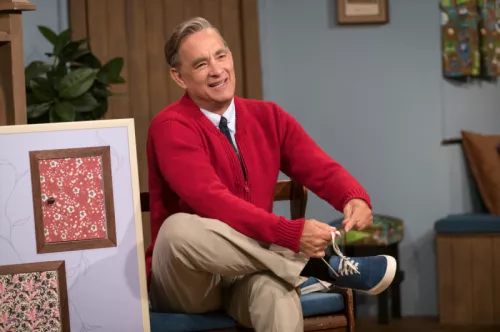Mister Rogers’ Neighborhood was a children’s television show in the US that aired for over more than 30 years. Its host, Fred Rogers, has now been depicted on screen by Tom Hanks.
Loosely inspired by an article about Rogers from 1998 by journalist Tom Junod, this is a story about dealing with a legacy of childhood trauma – a moral tale that would be at home on Mister Rogers’ Neighborhood itself. Stories and lines from the article are sprinkled throughout the film, though often in different situations from those described in the article. But while both Tom Hanks (as Fred Vogel) and Matthew Rhys (as Lloyd Vogel, loosely based on journalist Tom Junod) give admirable performances, it never fully hit home for me.
The film is framed as if it were an episode of Rogers’ children’s show, beginning with Fred Rogers asking if he can tell you about his friend. Throughout the film, establishing shots of locations, where you would normally see a city vista, for example, are portrayed with model sets like those used in the show.
It brings an odd artifice to a film which takes measures to show that ‘Mister Rogers’ was not an artificial on-camera personality but the true character of Fred Rogers. It also distanced me emotionally from Vogel’s story, constantly reminding me that I was watching an artificial construction.
The film is a little infantilising, both in the child-programming setup and in Vogel’s simplistic character arc across the film. Beginning the film with pent-up anger, it takes only one meeting with Rogers for him to begin to open up and change. Mid-way through the film is a surreal dream sequence where Vogel imagines himself as part of the set – Junod refers to it as ‘magical realism’. Indeed, Vogel seems more like a character on a children’s show than a real adult with a complicated psyche that cannot be fixed virtually overnight.
It’s worth noting that the film is not really about Mister Rogers, who is merely a supporting character, so the insights into him are only skin-deep. For a man who has explored and shaped millions of children’s psyches, there is little to no explanation of his own psyche. In one of their early meetings, Vogel asks Rogers if he ever gets angry, to which Rogers explains that he does, but he deals with it.
It’s a central theme that recurs throughout the film, but we never actually see Rogers get angry or deal with anger (we do see Vogel dealing with anger). There is a brief, unexplained moment at the end of the film that doesn’t really pay-off when you haven’t seen this anger expressed in Rogers character at all until this point. It leaves the impression that there is a whole unexplored facet to the character. Rogers remains such an enigmatic figure that only research would reveal more about him.
Rogers’ faith is portrayed throughout the film. His wife talks about the importance of prayer and reading scripture in his daily routine, and he is portrayed in one scene praying for a list of people by name (something he apparently did 5am-7am every day). But the film shows little interest in fully exploring the effect his faith had on his work.
A review in The Telegraph refers to “the seeming inexplicability of this living embodiment of twee Americana’s multigenerational success, with his moth-eaten glove puppets and folksy homilies on life in all its complexity – death and divorce included”.
To my mind, it is anything but inexplicable – it is the fruit of a life lived using the talents God had given him in service to others. Similarly, in an Entertainment Weekly interview with director Marielle Heller and Fred Rogers’ widow, there is an ellipsis after Joanne Rogers refers to her husband as a minister, denoting content excluded from the recorded interview. What, I wonder, did she say about his pastoral role in that moment that EW didn’t feel was worth including in their interview?
It’s worth noting that this lack of outright exploration of faith mirrors Rogers’ own approach. He rarely spoke about his faith, believing that “you don’t need to speak overtly about religion in order to get a message across”. And certainly, the values in both the series and the film, such as like forgiveness, acceptance, love, and the release of anger, are rooted in the Christian faith. I have no doubt that there will be people deeply moved by it.
The film’s effects did linger. On my way home, passing multiple men and women living and sleeping on the streets of London, I found myself wondering how Mister Rogers would have responded to these people, my neighbours. I suspect he would have been much more neighbourly, and more Christ-like, than the many people who either ignored them or passed by looking guilty. Like Rogers, I can at least say that they featured in my prayers that night, though I wonder if Rogers would have stopped to speak with each person, so that he could pray for them by name.
All-in-all, it was a relaxing cinema visit with some laughs and positive moral messages. But in a month with many interesting films hitting cinemas, viewing can probably wait for its release on the streaming platform of your choice. If you’re interested in finding out about the role Rogers’ faith played in his work, more can be gleaned from the recent documentary Won’t you be my neighbor and the book Exactly as You Are: The Life and Faith of Mister Rogers by Shea Tuttle.
For more on Rogers specifically, and how we might be inspired by his practical faith, read my article The Christian behind the movie.



